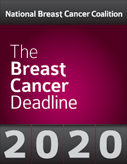The NBCC Holds Annual Summit and Pushes for Deadline 2020
Last week the National Breast Cancer Coalition (NBCC) held its annual summit. The meeting drew over 600 women to its opening rally in a Crystal City ballroom on Saturday, along with students who participated in sessions for Emerging Leaders, and a few men who joined in lectures and panels, and lobbied on Tuesday on Capitol Hill.
The NBCC aims to get HR 3067, the Accelerating the End of Breast Cancer Act, passed by the House of Representatives and, ultimately, into law. The bill ties in with Deadline 2020 and with the conference theme: “It’s Time.”
The opening rally, organized in the style of a political convention, was lively. When I entered, participants – or “activists,” as they might be called – were rocking to Three Dog Night’s Joy to the World. Attendees congregated by state and region. Most wore festive garments and signs over black tee shirts carrying the Deadline logo: women from Maine wore floppy red lobster hats; a contingent from Pennsylvania held brightly-decorated kite-posters; a group from Oregon played kazoos (to We’re Not Gonna Take It) and supported multicolored umbrellas over their heads; members of the CBCC lifted Rosie the Riveter boards proclaiming: “We Can Do It!” Each region offered a progress report. In videos, these demonstrated a mix of activism (“waving breast cancer goodbye” on a Rhode Island beach) and seriousness (scientist in a lab, explaining why the research matters).
Fun aside – the meeting’s mood was overwhelmingly serious. Each day’s session opened with a moment of silence to recall women who have died from breast cancer. There were plenary lectures, and smaller educational meetings on topics like “A Critical Review of New Therapies for Metastatic Breast Cancer,” “Estrogen Exposure throughout the Life Cycle,” “Nuts and Bolts of Congress,” “and “The Environment and Breast Cancer.” Many of the women there have metastatic cancer, or had cancer. I had lunch one day with a woman whose early-stage cancer came back after 15 years. Many of the college-age people attending have moms with advanced disease or who died from that. There were young people who’d had breast cancer – some under 30 years old. The few men I spoke with were affected by their wives and mothers’ illnesses. You couldn’t walk a few feet without hearing a sad tale, or seeing the outcome of loss, in motivating people to take action.
In her remarks, Fran Visco, the NBCC Founder and leader, reminded the group that breast cancer remains a leading cause of cancer deaths. Each day, on average, 110 women die in the U.S. from breast cancer. That’s the equivalent of a woman dying every 14 minutes from the disease, she explained. “This should not be considered success, or even meaningful progress.”
“We need to take a less comfortable approach,” she said. “The system rewards safe ideas. We need to take risks.” She spoke of the Artemis project, an NBCC-supported research program to develop a preventive breast cancer vaccine. “There’s a moral imperative to do these trials,” she said. “We’ll get scientists to form new collaborations, to change their focus not on the next grant, or publication, but on the real goal, which is saving patients’ lives.”
In the 20 years since NBCC was founded there’s been progress, she said. “But we’re nowhere near close enough.” She referred to Dr. Jonas Salk, whose polio vaccine came through after just seven years in the lab, and – as did others at the same meeting – to JFK’s 1961 promise to put a man on the moon. That seemingly impossible mission got done in less than nine years. The idea of the Accelerating the End of Breast Cancer Act is to leverage our nation’s prior investment in biotechnology, and to use that work – including much research already done – to end to breast cancer and stop metastases. Visco hopes to deliver a petition to the President on inauguration day in January, 2013.
Through the meeting, I gained a better sense of the organization and Deadline’s purpose. In the words of Senator Kirsten Gillebrand, who met with a delegation from New York on Tuesday: “It creates an urgency about the issue.”
—
Elaine- A very well done and evocative summary of 4 jam packed days. Thanks for writing this – and for coming. It is so important to have this work accurately communicated to the public. Thanks again, Annette